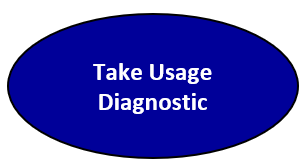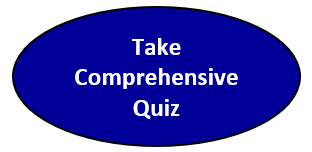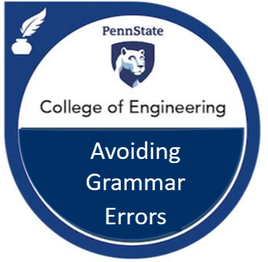Tutorial
Section 3: Usage
|
Usage refers to the way that we use words. For example, when is it proper to use affect as opposed to effect? Likewise, when should you select continual and when you choose continuous? With technical reports and journal papers, another challenge for usage concerns the correct verb tense--for instance, whether to select "The results showed..." as opposed to "The results show...." Still another important aspect of usage for engineers and scientists is whether to use numerals or to write out numbers.
|
|
If you selected all of the correct answers on the Kahoot, congratulations. You can proceed to the Comprehensive Quiz. However, if you missed questions, work through the films and quizzes below.
|
|
If you did not know the proper usage of some words in the Kahoot, then use the usage guide [4] to learn how to use those words. Afterwards, take the two review quizzes on word choices.
|
affect effect
amount number compose comprise continual continuous farther further fewer less its it's lead led principal principle that which
|
|
If you struggled with questions on either verb agreement or verb tense, view Films 8 and 9 and then take the review quiz on verb agreement and tense.
|
Film 8. Verb agreement in scientific writing. Film 9. Verb tense in scientific documents. |
|
If you struggled with the questions on expressing numbers, view Film 10 and take the review quiz on expressing numbers.
|
Film 10. Expressing numbers in scientific documents. |
|
If you struggled with questions on possessives, view Film 11 and then take the review quiz on possessives.
|
Film 11. Possessives in scientific writing. |
Acknowledgments
This self-study guide was made possible by funds provided by the Leonhard Center for the Enhancement of Engineering Education in the College of Engineering at Pennsylvania State University. Providing technical assistance on the films is the Office of Digital Learning, which is also in the College of Engineering at Penn State.
This self-study guide was made possible by funds provided by the Leonhard Center for the Enhancement of Engineering Education in the College of Engineering at Pennsylvania State University. Providing technical assistance on the films is the Office of Digital Learning, which is also in the College of Engineering at Penn State.
Role |
Name |
Department |
Institution |
Faculty Editor |
Professor Michael Alley |
College of Engineering |
Penn State |
Film Editor |
Casey Fenton |
Office of Digital Learning |
Penn State |
Film Editor |
Elaine Whitmer |
Office of Digital Learning |
Penn State |
Associate Editor, 2022 |
Olivia Brencovich |
Mechanical Engineering |
Penn State |
Website Editor, 2021-22 |
Marissa Beighley |
Computer Science |
Penn State |
References
- Peg Tyre, "The Writing Revolution," The Atlantic Monthly (October 2012), pp. 99-100.
- Catherine Walker, "Time to Stop Avoiding Grammar Rules," The Guardian (September 2012).
- Tessa Schlesinger, "Why Grammar Matters," Owlcation (7 September 2017).
- Michael Alley, The Craft of Scientific Writing, 4th ed. (New York: Springer, 2018), Appendices A, B, and C.
- Cheryl Glenn and Loretta Gray, The Writer's Harbrace Handbook, 5th ed. (Boston: Cengage Learning, 2012).
- William A. Sabin, The Gregg Reference Manual: A Manual of Style, Grammar, Usage, and Formatting, 11th ed. (New York: McGraw-Hill, 2010).
- Theodore Bernstein, The Careful Writer, 2nd ed. (New York: Free Press, 1995).
Please feel free to provide comments, questions, and suggestions for the films, text, and quizzes of this website. To help us understand your feedback, please let us know whether you are a student or faculty member (or other professional).





